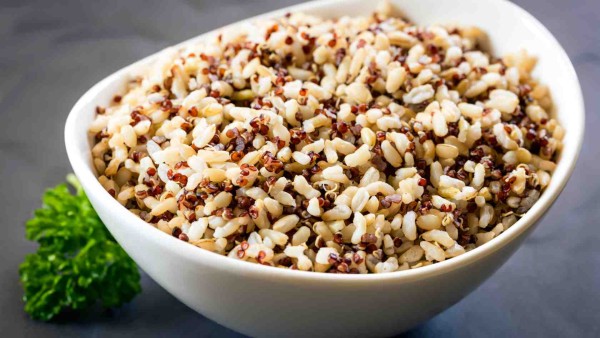Madhya Pradesh, bathed in sunshine and blessed with fertile plains, whispers promises of hidden treasures. One such gem, often overlooked but bursting with potential and health benefits, is the ancient superfood quinoa – a canvas for a thriving food processing venture. Setting up a plant in this land of plenty can transform fleeting quinoa seasons into bountiful harvests. Let's peel back the husk and explore the possibilities.
Demand Devouring Distance: Forget fleeting seasons! Today's consumers crave convenience and variety. Quinoa flakes for breakfast cereals, pre-cooked quinoa pouches for quick meals, quinoa flour blends for gluten-free baking, quinoa snacks in exotic flavors, and even quinoa-infused protein bars are in high demand across domestic and international markets. Health-conscious trends further amplify this demand, making quinoa products a guilt-free indulgence.
Quinoa Fields at Your Doorstep: While India isn't a major quinoa producer yet, Madhya Pradesh has shown promising results in recent years. Sourcing directly from contract farmers or aggregators ensures a steady supply of these golden seeds. Additionally, government initiatives like the National Mission on Quinoa are actively promoting its cultivation.
Processing Techniques: From cleaning and sorting to dehulling, rinsing, drying, and milling, the options are diverse. Choose techniques like cold washing for preserving delicate nutrients or stone-milling for retaining the germ's nutritional value. Upcycling quinoa bran and saponin (the bitter-tasting compound) into animal feed, biofuel pellets, or cosmeceutical ingredients adds sustainability.
Machinery Matters: Your arsenal might include cleaning lines, sorting machines, dehullers, washers, dryers, mills, packaging units, and bran processing equipment. Indian and international brands like Buhler, GEA, Uflex, and Krones offer reliable options.
Beyond the Grain: Don't discard the bran and saponin! They hold hidden treasures. Upcycle quinoa bran into gluten-free flours or animal feed. Extract natural saponins for their anti-inflammatory properties in cosmetics or use them as a natural pesticide. Even the wastewater can be treated and used for irrigation.
Value Addition is Key: Craft value-added products like organic quinoa pasta with ancient grains, quinoa-infused protein bars for athletes, or instant quinoa soups with unique flavors to stand out in the market. Explore functional food options like quinoa-based baby food or diabetic-friendly quinoa bread with reduced starch.
Preservation Pointers: Proper storage in temperature-controlled silos and vacuum-sealed packaging are crucial for extending quinoa's shelf life. Consider hermetic bags for additional moisture protection.
Nutritional Nectar: Quinoa is a complete protein powerhouse with essential amino acids, fiber, B vitamins, minerals, and antioxidants. Processing techniques that minimize nutrient loss ensure your products offer health benefits beyond taste.
Packaging with Punch: Attractive and sustainable packaging is crucial. Consider biodegradable pouches, paper wraps, or recycled cardboard for eco-conscious appeal. Think beyond the usual - eye-catching designs or informative labels about the superfood power within can set you apart.
Market Mania: The domestic market for processed quinoa products is witnessing rapid growth, driven by rising disposable incomes, health trends, and gluten-free diets. Additionally, countries like the US, Europe, Japan, and the Gulf nations crave diverse quinoa delights, opening doors for exports.
Certification Compass: Obtain FSSAI and APEDA licenses for domestic sales. Specific certifications like HACCP, BRC, and IFS may be required for international markets.
E-commerce Advantage: Leverage online platforms like Amazon, Flipkart, and BigBasket to reach a wider audience and boost sales. Explore social media marketing for targeted campaigns and brand building.
Cost Considerations: Setting up a basic quinoa processing plant in Madhya Pradesh can cost around Rs. 50 lakhs to Rs. 2 crores, depending on capacity, machinery choices, and infrastructure.
Supplier Savvy: Indian companies like Buhler, GEA, and Uflex supply processing machinery. MP State Industrial Development Corporation (MPIDC) can assist with sourcing and government subsidies.
Sweet Subsidies: Schemes like Pradhan Mantri Kisan Sampada Yojana (PMKSY) and National Mission on Quinoa offer financial assistance for setting up food processing units. Contact MPIDC or the Ministry of Food Processing Industries for details.
The Golden Harvest: With meticulous planning, strategic execution, and government support, a quinoa processing plant in Madhya Pradesh can be a fruitful venture. So, grab a seed of opportunity, watch it blossom into golden profits, and savor the diverse, healthy taste of quinoa revolution!
Remember: This blog post is a starting point. Conduct thorough market research, consult with experts, and develop a detailed business plan before embarking on this venture.


